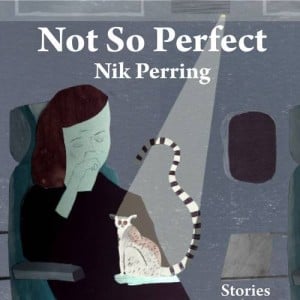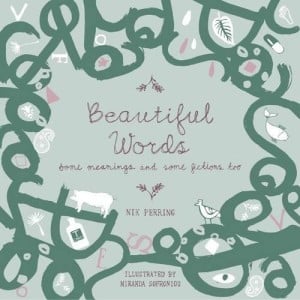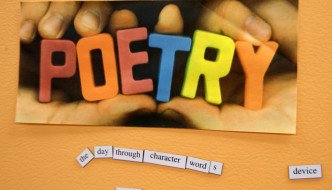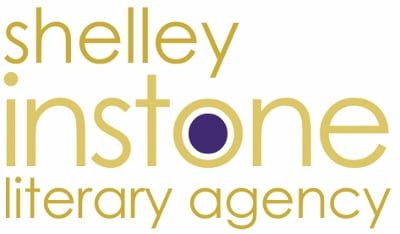Short story writer Nik Perring talks about finding your place
December 20, 2015

Nik Perring
Nik Perring, short story and flash fiction writer and all round nice guy was born in Staffordshire, grew up near Stockport and, since January 2105, has been living and working in Sheffield. With the recent publication of his book ‘Beautiful Trees’ life has been pretty hectic but we managed to catch up with Nik near closing time in a local café.
What are your earliest memories of writing?
I was about thirteen and we were studying WW1 in history and poets in English (Isaac Rosenburg, Siegfried Sassoon…). When I put the two things together it made sense; when you can see what people are really thinking about the bad things that are happening, the kind of honesty you get through art really translated. Before that I was interested in song lyrics.
Which books did you read as a child?
I am told constantly by my mum that I was obsessed with Thumbelina. I don’t really remember that but I definitely loved fairy tales, which I think shows in my work: a definite fairy tale kind of theme or magical realism and a suspension of disbelief. I loved all the standard books like Narnia, The Black Cauldron, Stig of the Dump and the GI Jo books.
Did you get any encouragement to write?
No, it was definitely off my own back. That’s one of the problems with being young and wanting to write. You don’t really get exposed to people who do it. Certainly I was taught by teachers not by writers and making stuff up wasn’t really encouraged. I did a poem in Y6 about joy, which was horrible. I don’t think writing is something that you choose to do I think you have something to say and stories to tell and you need to get them out. Like Mark Twain said about his itch, ‘Seemed like I’d die if I couldn’t scratch,’ like this itch of writing that you have to scratch.

Not So Perfect
I never went to a course or to a writing workshop and I didn’t go to university to get a degree. I read a lot and wrote a lot and practised and wrote an awful lot of rubbish and then more rubbish and then even more until I got to a point where I thought ‘this is starting to click’. And that took a while, in fact, I started writing after I was made redundant in 2000/2001. I took a bit of time off to see if I could write and I started off in journalism writing features and stuff like that and I ghosted for The Times and I wrote a kids’ book that came out in 2006 and did really well (I Met A Roman Last Night, What Did You Do?). But when I started reading Aimee Bender and Etgar Keret’s work; people writing the sort of stories that I thought I wasn’t allowed to, that changed everything! I had had short stories published before then – kind of horror, but that was the first time I realised that I could write the weirder stuff: using the fantastic as a metaphor for real life.
I think that in writing if you say anything simply and boldly your reader will believe you. If you say confidently that there was an 8-foot man who lived in a tree and you could only see him at Halloween people will believe you. Fantasy doesn’t always stretch to sorcerers and swords and elves, fantasy can be anything at all. The point of the writing is that you’re allowed to make things up – that’s the joy of it all. Look at the Life of Pi people don’t normally get on boats or rafts with tigers! Or look through the classics at Dracula or Frankenstein!
What are your main influences?
Aimee Bender, Etgar Keret (from Tel Aviv, the first Israeli to be published in Palestine and his book The Seven Good Years has just been included in the Guardian’s best biography and memoir books of 2015), Kurt Vonnegut I think is a genius as a man and as a writer, Ali Smith, Michael Czyzniejewski and Michael Kimball.
And Charles Perrault, he was the first writer and collector of fairy stories as they were supposed to be so – like the grimmer side of things. So you have Cinderella marrying the prince but it doesn’t stop with that, she has kids and her mother-in-law hates her, boils the kids and serves them in a pie. This idea that fairy tales are for kids is just a Victorian thing and before then they were a lot more interesting, less like life lessons.
At what point do you decide if it’s going to be a piece of flash fiction or a short story?
When it’s finished. I write everything first draft by hand and I write ‘til the story’s finished. If it happens to be 200 words that’s fine. Same if it’s 7000 words. The story has got to come first. Once you start to try and wrestle it into a particular shape or size it stops being what it is.
Do you write poetry?
(At this point the waiter comes to clear our table.
‘God no – please don’t take the cakes away!!!!’ says Nik.’ )
I’ve had poetry published but it wasn’t very good and out of respect for poets I’d never call myself a poet. I’m a short story writer.
I think you find with short stories (and its hard to categorise because each story is different) but a short story tends to be the story of one moment – not all the time – some stories will fit a whole life into 2 or 3 pages – but it tends to be like poetry. Often it’s about one moment or one character. Going back to what I said earlier I think it’s about what works for that particular story. What if I told the story of war and peace? – that’s an immense number of characters and that works for it – that is that story.
But then you’ll get something like Aimee Bender’s The Rememberer where her boyfriend is aging backwards, experiencing ‘reverse evolution’ as a metaphor for their relationship declining and they are growing further apart – that doesn’t need anything else because that’s what that story is. If you pad it out you end up losing the point of what you are trying to say cos it gets muddled up like soup. Rather than just one tomato in a pan that you can see very easily you put lots of different bits in it you end up with a broth and then it’s hard to find that one tomato underneath potatoes and lentils.
 You’ve just published Beautiful Trees, what’s the story with this book?
You’ve just published Beautiful Trees, what’s the story with this book?
Beautiful Trees and Beautiful Words are part of a trilogy. It’s basically a story of Lucy, Lilly and Alexander told through significant words to them or/and trees to them and Shapes will be the last one. It’s kind of like an adult picture book: hugely illustrated and the text is very minimal. You get to see the whole journey of a relationship with these three people through words or trees or shapes.
A lot of people have said it’s poetic but there are facts in there too that I love. For example trees can talk to each other. If you look at fruit trees – if one gets attacked by something say a plague of insects it will let out some kind of hormone in the air and the other trees will defend themselves which is why you tend to see in an orchard one tree that’s suffering and all the rest are fine. I love that idea and translated it into how that affects the characters. The character Alex was with Lucy in the first book and now he’s with Lilly; he met her at a garden centre and bought a tree so that he could talk to her. Shapes – you’ll have to wait and see!
You have a 3-book deal with Roast. What’s that about?
Yes! Roast books’ve done me very proud. The object was to make the books as beautiful as the stories in them, illustrated by Miranda Sofroniou.
All of my books have been illustrated which is quite unusual for someone writing fiction for adults. The publishers and I have the same conversation every time where I say, ‘Well I think it could be cool with this,’ and then they go, ‘Right leave it with us.’ And every time I’ve been blown away by their decisions.
Miranda has done an amazing job and I like the idea of it being a collaboration. If you write a book or a story and you put it out there you have to trust the reader to interpret it as they need to and see the characters in their own specific way. It’s the same kind of thing with an illustrator cos you trust them with your words and they put their own interpretation on it. You hope they make it better and they definitely have done with all of my books.

Beautiful Words
When do you write?
When I can find five mins. Or when I’ve got a story to tell. I have a process not a routine any more. I used to think you had to write very day to keep the writing muscle going. I still think that is good advice but I ended up doing an awful lot of writing for the sake of it and churning out stuff that wasn’t particularly great so I’ve stopped doing that now. But I’ve been doing this for 10 or 12 years now so I’ve got to the point where I know when something’s good enough. I know what works for me – that doesn’t mean to say it’ll work for anybody else.
What are your next plans?
The next book should be Beautiful Shapes. I’m lucky that Roast allowed me to take a risk in doing something a little bit different. But Rob Ryan made a career out of doing something a little bit similar with his books and art. I think if it’s something that you believe in and you’ve worked hard at and you can stand back and see that you are proud of it there’s no reason why someone else won’t think the same.
What do you think of the writing scene in Sheffield?
I’ve not been involved in it too much other than teaching. From what I can gather – being an outsider which is where I tend to sit – it seems exciting and it’s good to see there’s so much happening. I know there’s loads of open mic nights and poetry evenings which is brilliant. They seem accessible and welcoming which is the main thing because I think writers need confidence. So if you’ve got places where you can be confident and do your stuff that can only be a good thing.
I did an event for Off The Shelf This Year with Marina Lewycka and Virginia Macgregor. That went really well and hopefully we’ll be doing it again next year.
I help run a young writers group (age 14-19) at the Sheffield Central Library and one in Rotherham. And I’ve been running one off groups with primary school age children. I’ll be doing that next year but I need to dot the I’s and cross the T’s first.
It’s all about finding your place, isn’t it?
You can find out more about Nick at www.nikperring.com. His books are available from www.roastbooks.org, Waterstones, and Amazon.
Filed under: Written & Spoken Word
Tagged with: Beautiful trees, books, miranda sofroniou, Nik Perring, Sheffield, short stories, writing



Comments